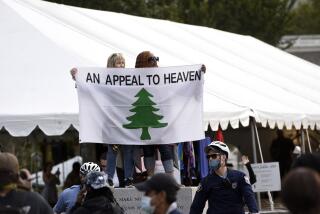Supreme Court says Mojave cross can stand
- Share via
Reporting from Washington — The Supreme Court gave its approval Wednesday to displaying a cross on public land to honor fallen soldiers, saying the Constitution “does not require the eradication of all religious symbols in the public realm.”
Speaking for a divided court, Justice Anthony M. Kennedy said the 1st Amendment called for a middle-ground “policy of accommodation” toward religious displays on public land, not a strict separation of church and state.
Kennedy disagreed with judges in California who said U.S. National Park Service officials must remove a small Latin cross from the Mojave National Preserve that had stood since 1934 to honor soldiers who died in World War I. The judges said the display of the cross on public land amounted to a government endorsement of religion.
“A Latin cross is not merely a reaffirmation of Christian beliefs,” he wrote. “Here, a Latin cross in the desert evokes far more than religion. It evokes thousands of small crosses in foreign fields marking the graves of Americans who fell in battles, battles whose tragedies are compounded if the fallen are forgotten.”
The 5-4 decision told the lower-court judges to reconsider the matter and presumably uphold the display of a cross. Chief Justice John G. Roberts and Justice Samuel A. Alito Jr. joined Kennedy’s opinion, and Justices Antonin Scalia and Clarence Thomas agreed separately that the cross can remain on display.
Retiring Justice John Paul Stevens spoke for the dissenters. The government has good reason for “honoring all those who have rendered heroic public service regardless of creed,” but it should “avoid endorsement of a particular religious view” in doing so, he said.
Justices Ruth Bader Ginsburg, Stephen G. Breyer and Sonia Sotomayor agreed.
The Mojave cross has been tied in litigation for years. The case had been watched closely because it was the first church-state-separation dispute to come before the Supreme Court since John Roberts became chief justice.
More to Read
Sign up for Essential California
The most important California stories and recommendations in your inbox every morning.
You may occasionally receive promotional content from the Los Angeles Times.











